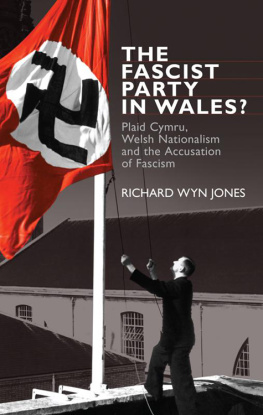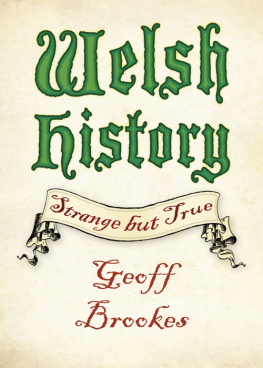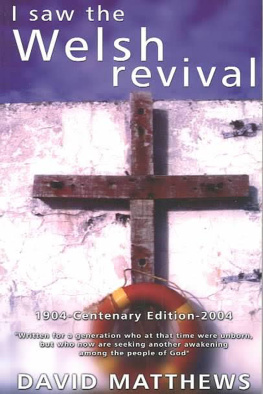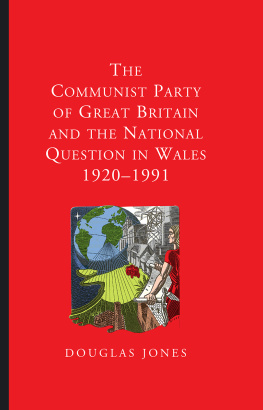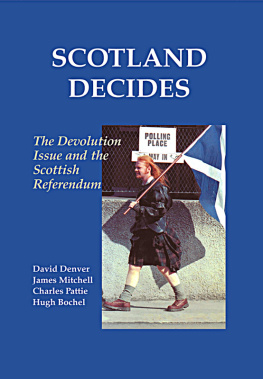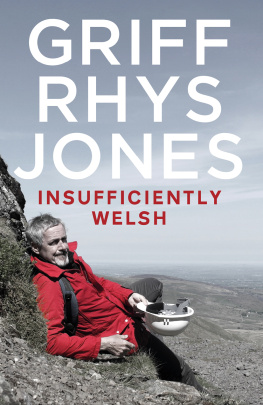Richard Wyn Jones and Roger Scully, 2012
All rights reserved. No part of this book may be reproduced in any material form (including photocopying or storing it in any medium by electronic means and whether or not transiently or incidentally to some other use of this publication) without the written permission of the copyright owner. Applications for the copyright owners written permission to reproduce any part of this publication should be addressed to the University of Wales Press, 10 Columbus Walk, Brigantine Place, Cardiff CF10 4UP.
www.uwp.co.uk
British Library CIP Data
A catalogue record for this book is available from the British Library.
ISBN 978-0-7083-2485-1
e-ISBN 978-0-7083-2642-8
The right of Richard Wyn Jones and Roger Scully to be identified as authors of their contributions has been asserted in accordance with sections 77 and 79 of the Copyright, Designs and Patents Act 1988.
Preface
The referendum that took place in Wales on 3 March 2011 was a curious event. As we discuss here, there are good reasons to argue that it should never have happened. And when the referendum did occur, the clear majority of the Welsh electorate chose not to bother participating. Yet, underwhelming as it was in many respects, the referendum was also an event of signal importance to Wales.
The referendum was important because the process by which this rather bizarre vote came to occur encapsulates so much about characteristic pathologies of Welsh political life. The referendum was also important because the way in which the campaign was fought, and the result that the vote produced, crystallized deeper and broader changes in Welsh politics over the previous decade. The referendum mattered because of the direct consequences that the result would bring over subsequent years for the policies of the Welsh Government and the responsibilities of the National Assembly for Wales. The referendum was also important because of the further consequences, for how Wales and the other nations of these islands are governed, that may well follow from the result.
For all these reasons, the 2011 Welsh referendum deserves serious, sustained analysis. In this book, we attempt to provide that: focusing not only on the vote itself, and the immediate campaign preceding it, but also trying to place this vote in its broader historical, institutional and political context. The referendum was an important event, but as we have come to understand all too well in Wales, devolution is a process.
The research on which this study was based has received support from a number of quarters. We gratefully acknowledge financial support from the Economic and Social Research Council (grant RES-000-22-4496) to conduct the 2011 Welsh Referendum Study (WRS), which provides the bulk of the data used in chapter six. WRS was conducted in collaboration with the survey company YouGov: at various stages of their work on this project, Laurence Janta-Lipinski, Joe Twyman, Coralie Pring and Kate Davies at YouGov all distinguished themselves for their professionalism and their determination to help us deliver the best surveys possible. We are also very grateful for the helpful suggestions on the content of the surveys made by Robert Johns of the University of Essex, and by participants in a seminar at Cardiff University in January 2011.
We are also happy to thank the McDougall Trust for a small grant which supported the conduct and transcription of the interviews with those involved in the referendum campaign that provide much of the evidence discussed in chapter four. We are very grateful to our interviewees: Leighton Andrews, Rachel Banner, John Broughton, Nigel Bull, Meilyr Ceredig, Cynog Dafis, James Davies, Nigel Dix, Mark Drakeford, Lisa Francis, Len Gibbs, Daran Hill, Rob Humphreys, Roger Lewis, Cathy Owens, Lee Waters and Rebecca Williams, as well as some who spoke to us on condition of anonymity. They were, without exception, generous with their time and their insights. Given that some of the events discussed in the book are so recent and politically contentious, there have inevitably been some instances in which we had to rely on the testimony of our anonymous sources. Where we have been unable for this reason to supply a named source we have in each case sought to verify the claims made with two different (if anonymous) sources. We also thank Einion Dafydd and Catrin Wyn Edwards for their assistance in conducting the interviews, and Laura Considine and Lorrae Wright for help with transcription. Such is the richness of the material supplied in many of these interviews that we will be depositing edited copies with the Welsh Political Archive at the National Library of Wales in Aberystwyth, in order that they be available to future researchers. Some of the archival and interview material utilized in chapters one and two was collected as part of an earlier research project undertaken by Richard Wyn Jones on behalf of the University of Wales Board of Celtic Studies. We would like to thank both the Board and project researcher Bethan Lewis for their support. A final note on sources: all the website URLs referred to were current as of August 2011.
Aspects of the research reported here were presented in draft form at the annual conference of the Political Studies Association in London, April 2011; at breakfast seminars in Cardiff and Aberystwyth in June 2011; and at the annual conference of the Elections, Public Opinion and Parties specialist group in Exeter, September 2011. We thank participants in all those events for helpful comments and criticisms. We also thank Dafydd Trystan Davies, Lee Waters, Joanne Foster and an anonymous reviewer for their detailed comments on individual chapters. We are wholly responsible for any errors or inadequacies that remain.
We also gratefully acknowledge support and assistance from our home institutions, Aberystwyth University and Cardiff Universy, and particularly our colleagues in the Institute of Welsh Politics at Aberystwyth and Cardiffs Wales Governance Centre. And we thank Sarah Lewis and the rest of the team at the University of Wales Press for all their assistance.
Last, but certainly not least, we thank our families for their consistent support, encouragement and love.
Roger Scully
Aberystwyth
Richard Wyn Jones
Treganna, Caerdydd
The road to the referendum
In April 2009, the House of Lords Select Committee on the Constitution published a report entitled Referendums in the United Kingdom. This is a question of relevance to many political systems, and one worthy of serious consideration.
Referendums have traditionally been regarded as foreign to the Westminster model of parliamentary democracy. This model is one based on indirect democracy. It is characterized by the election of representatives who campaign on the basis of party manifestos. Once returned to parliament it is the task of members of the majority party to form a government to implement the platform on which it was elected. While the role played by the electors is fundamental to the democratic legitimacy of the system, it is nonetheless limited. Beyond their infrequent visits to the polling booth, the people delegate the task of government to others. They are not invited to pick and choose between different elements of any partys platform. Rather, the governing party is regarded as enjoying a mandate to implement its programme as a whole.



